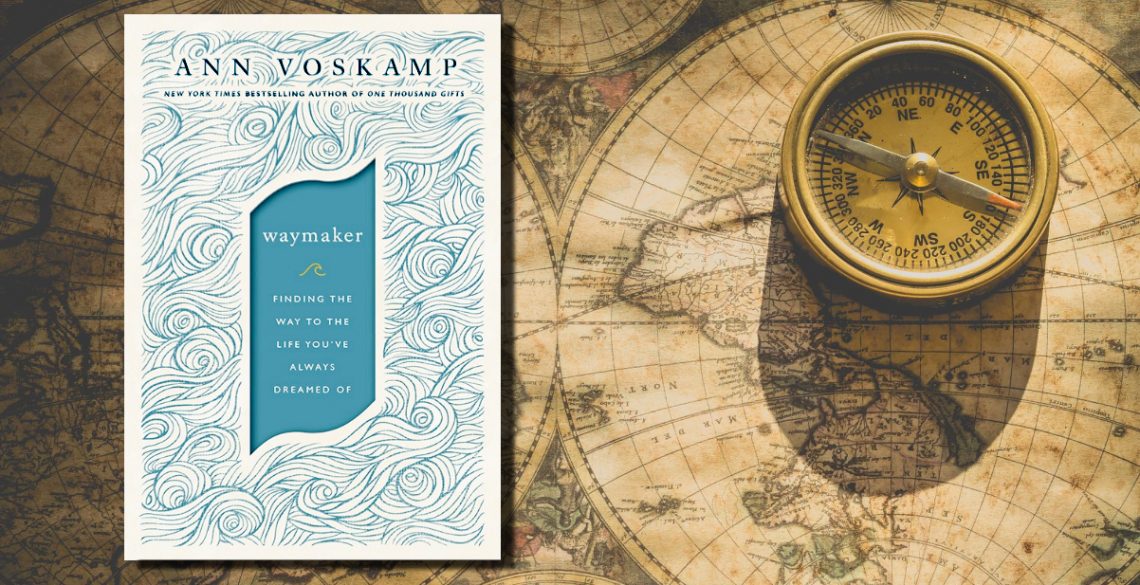
Waymaker by Ann Voskamp–A Review
At its heart, Ann Voskamp’s newest book Waymaker is a romance. It’s the story of God’s love for us couched in the terms of a story, a true story of a marriage that almost died, an adoption with seemingly insurmountable challenges, and how deep heart pain can derail our best attempts to honor God. I admit I read it too fast the first time, reading the human story first, thirsting to find out How The Story Ended.
I’m a Christian romance novelist at my core. My native language is the story of God’s love for us framed in terms of human relationships. Ann spoke to me in my language, and my heart heard and understood both stories, the one about how I need to see and interact in my marriage, my friendships, my parenting, anything to do with my people. And then at a deeper level, my heart heard the more important story about how all the rest is impossible if I don’t nurture and pursue that deeper relationship with God, the one the human relationships only hint at, and sometimes hint at spectacularly badly.
If you’ve never read Ann before (and I am ashamed to say I hadn’t), you need to know that she is an emotional writer. She uses word pictures and sometimes takes a circuitous route to say what she needs to say. If you prefer a more practical, logical writing style, then know going in that you won’t get it here.
Red Sea Roads
However, within those circuitous paths she unpacks a lot of truths about God and his heart towards us. Her central Scriptural truth in Waymaker comes from Exodus 14, where the Israelites, under Moses’ leadership, pass through the Red Sea. She speaks often of Red Sea Roads, times when we, like Israel, find ourselves in impossible situations, those suffering moments when it seems there is no way out. Israel found themselves between an impassible sea and the Egyptian army, and sometimes our situations seem just as hopeless.

God did not give them an out, a simple rescue. Instead, he gave them a new path through. Ann suggests that’s what God does for us. We don’t always escape heartache. In fact, we seldom escape heartache. In this sinful, broken world we face hardship of every size and shape, and God uses all of it to move us forward, closer to him. He leads us through, always at our side, his voice in our ear coaxing us on and loving us and growing us.
Life isn’t about a way to a destination but about a way to travel, a way to be wholly known and still wholly loved.
Waymaker p 79
The path is seldom what we expect—did any of the Israelites, in the midst of their rock and a hard place moment, expect the sea to open up? I doubt it—but it is what we need, and it leads always toward God. Using Hebrew word study, personal anecdotes, and a lot of Bible references, she spends the book expounding on this idea of us on Red Sea Roads, moving through hardship with God at our sides. Her secondary focus is a method of daily self-examination she calls the SACRED path or the SACRED compass.
The SACRED Compass
Ann became famous for her first book, One Thousand Gifts, which suggests taking time every day to focus on the gifts God has given. Now she expands that daily examination in Waymaker with the SACRED compass. The letters in the word stand for the parts of this examination: Stillness to Know God, Attentiveness to Hear God, Cruciformity to Surrender to God, Revelation to See God, Examine to Return to God, and Doxology to Thank God.
With each letter, each segment, she gives questions a person can ask daily to examine heart and soul and determine if we are moving forward with God, if we are hiding from Him, how we are doing as pilgrims on his paths, even if that path leads through a Red Sea Road.
There is so much truth, so much honesty, and so much encouragement packed into these pages that I know Waymaker is going to become a book I reread, mark, dog-ear, and otherwise wear out before the journey is over.
I worked the Study Guide alongside the book, and I recommend this. The book is a beautiful story with beautiful lessons and teaching about remaining in God’s love through all situations. The study guide expands on the SACRED compass with practical explanations of each letter and how to use this method of self-examination to remain in God. I am not sure I’d have truly understood her SACRED method without the study guide.
Snag the Study Guide
Each book can stand alone. You can buy and work through the Waymaker study guide—and the videos, which are available to you if you purchase the study guide—without ever reading the book, and it is a very complete study into God’s heart for us. It is missing the personal story, or it only hints at it, but as far as a Bible study with deep, practical application and meaning, it’s an amazing tool.
Add the book, which goes deeper and shows not only Ann’s successful walks through Red Sea Roads with the SACRED compass but also her grand failures, and there is a beautiful depth that sticks with you. At least it is sticking with me. I have gone over parts of the book in my head for days, and I intend to read it again. This isn’t a book to read once and stick it on the shelf. There is so much truth, so much honesty, and so much encouragement packed into these pages that I know Waymaker is going to become a book I reread, mark, dog-ear, and otherwise wear out before the journey is over.
Waymaker for anxious souls
The letter E of the SACRED compass, Examine to Return to God, is all about fear. What fear keeps you from God? What gets in your way? Beyond that, she gets to the heart of fear itself. In her opinion—and she uses Augustine’s writing to get there, fear has to do with losing what we love. This quote is from the study guide, and it is one of my favorite quotes from both guide and book:
“As Augustine points out, ‘we fear nothing save to lose what we love.’ Our deepest loves drive our deepest fears. When we want what we want too much, when our love for what we want outsizes our love for God, our fears outsize our living.”
That’s it. Many times my fears outsize my living. It has to do with trusting God. Always she comes back to that, and she uses two Hebrew word studies to get there. Along with her words on fear, these two Hebrew words are going to stick with me the longest.
Hesed–Attachment Love
The first is Hesed, or Chesed. The word lovingkindness was coined as a way to try to capture the meaning of this word, because we don’t have an equivalent. It is the love of God toward us, and it is a deeper, richer love than we can understand. Of hesed she says: “Used nearly 250 times in Scripture, in such a powerful manner that some theologians have suggested it may be the most important word in Scripture, hesed is the forever covenantal, always unconditionally, unwaveringly loyal, kind love of inseparable bonding, of divine family, of eternal attachment. Pay attention: Hesed is attachment love.” (p 33)
So God loves us with this impossible, unbreakable, attachment love. Once God loves us this way, he never stops. David sings of this love over and over, sometimes translated lovingkindness, sometimes steadfast love, but it meant everything to him. In light of hesed David could face enemy after enemy with courage and confidence, because this love that could not be shaken. God’s deep, unbreakable attachment to him made him fully safe.
Batach–Baby Possum Trust
Then the other word is what we translate trust. The word in Hebrew is batach, which means to cling or adhere to something. Again with the concept of being attached. I can’t explain how this definition resonated with me. I struggle with the idea of trusting God. His plans can walk me through such dark, sad roads. I trust him, and yet… I am not sure what it means to trust him. Trust him to do what? I trust God is there with me, but I also trust that sometimes His plans will shatter me. But if trust is clinging and adhering and attaching to God—for some reason that put it all into perspective.
Even when I doubt, even when I fear, I can attach. I can cling. My mind and attitudes may take time to catch up, but the posture of holding on, clinging like a baby possum, attaching to God and never letting go… That sums things up perfectly. It’s why David could call to God for relief, for help in terrible moments, and yet say he trusted. It is an active trust, a clinging with everything he had because really, there is nothing else to hold onto.
Hang On
The concept of attachment is second only to the concept of the Red Sea Road in the book. We are made to attach, not meant to be alone. So we attach to God, which is healthy and what we are made for. Or, we attach to other things, which leads to addictions and brokenness. That’s where her human romance stories come in. They show us in living color what it means to attach and detach and how the wrong attachments cause harm.
I’m not going to delve into the human stories—I want you to read this and fly through it like I did, anxious and concerned about the outcome, because it’s that tension, that wondering, that will lead you to place the same urgency on the spiritual story of attaching and anticipating and clinging to God when the road is sunny and warm and dry and when the road leads to a dark place where only a Red Sea moment will pull you through.
Through a God Lens
One final note, and really this is an aside. Throughout the book Ann and her husband look for signs of God’s intervention. I kept thinking of Jesus saying that a wicked generation asks for signs in Matthew 12. That’s not what this is. The Israelites wouldn’t believe unless Jesus showed them signs. This is simply an awareness, a posture of looking around. It’s the attentiveness of the SACRED compass, and I envy it. I suspect after spending so much time looking for gifts, she and her husband are very attuned to even the small details of God’s work around them.
To expect everything around them to point to God’s constant work in the world—I want eyes that see through that lens. The way through the Red Sea Roads is easier to see with eyes already attuned to God’s care and love in my life. I sound like a fangirl, but I recommend Waymaker wholeheartedly and the study guide along with it. Looking for encouragement in hard times? It’s here. Craving deeper intimacy with God? Also here. Within the stories and the teaching, I suspect there is something here for almost every pilgrim on the way. (Visit Ann’s Site for purchasing information for Waymaker and the Waymaker Study Guide.)




2 Comments
D'anah
Wow, what a review!!
My issue is the price😣
Thanks for sharing all that, as even your review helps !
Jill
Yes, non-fiction books can get super pricey! But I’m glad the summary in the post helps.